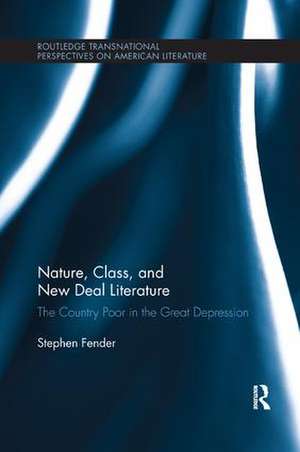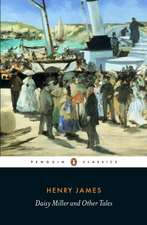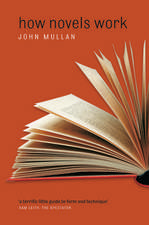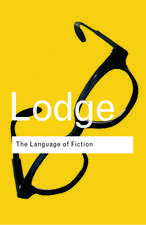Nature, Class, and New Deal Literature: The Country Poor in the Great Depression: Routledge Transnational Perspectives on American Literature
Autor Stephen Fenderen Limba Engleză Paperback – 5 feb 2018
Like the politicians and bureaucrats who accomplished the New Deal’s radical reforms in banking, social security and labor union law, the artists, novelists and other writers who supported or even worked for the New Deal were idealists, well to the left of center in their politics. Yet when it came to hard times on the American farm, something turned them into unwitting reactionaries. Though they brought these broken lives of the country poor to the notice and sympathy of the public, they also worked unconsciously to undermine their condition.
How and why? Fender shows how the answer lies in clues overlooked until now, hidden in their writing -- their journalism and novels, the "life histories" they ghost wrote for their poor white clients, the bureaucratic communications through which they administered these cultural programs, even in the documentary photographs and movies, with their insistent captions and voice-overs. This book is a study of literary examples from in and around the country Depression, and the myths on which they drew.
| Toate formatele și edițiile | Preț | Express |
|---|---|---|
| Paperback (1) | 325.34 lei 6-8 săpt. | |
| Taylor & Francis – 5 feb 2018 | 325.34 lei 6-8 săpt. | |
| Hardback (1) | 1060.19 lei 6-8 săpt. | |
| Taylor & Francis – 25 aug 2011 | 1060.19 lei 6-8 săpt. |
Din seria Routledge Transnational Perspectives on American Literature
-
 Preț: 389.38 lei
Preț: 389.38 lei - 22%
 Preț: 213.77 lei
Preț: 213.77 lei -
 Preț: 416.22 lei
Preț: 416.22 lei - 14%
 Preț: 324.02 lei
Preț: 324.02 lei - 14%
 Preț: 327.38 lei
Preț: 327.38 lei - 18%
 Preț: 312.15 lei
Preț: 312.15 lei -
 Preț: 444.45 lei
Preț: 444.45 lei -
 Preț: 490.83 lei
Preț: 490.83 lei - 28%
 Preț: 824.40 lei
Preț: 824.40 lei - 18%
 Preț: 1056.00 lei
Preț: 1056.00 lei -
 Preț: 304.90 lei
Preț: 304.90 lei - 18%
 Preț: 1061.93 lei
Preț: 1061.93 lei -
 Preț: 464.54 lei
Preț: 464.54 lei -
 Preț: 449.41 lei
Preț: 449.41 lei -
 Preț: 464.54 lei
Preț: 464.54 lei - 18%
 Preț: 1000.27 lei
Preț: 1000.27 lei -
 Preț: 466.49 lei
Preț: 466.49 lei - 18%
 Preț: 1057.05 lei
Preț: 1057.05 lei -
 Preț: 451.41 lei
Preț: 451.41 lei -
 Preț: 428.46 lei
Preț: 428.46 lei -
 Preț: 278.72 lei
Preț: 278.72 lei -
 Preț: 441.95 lei
Preț: 441.95 lei -
 Preț: 487.86 lei
Preț: 487.86 lei - 18%
 Preț: 999.19 lei
Preț: 999.19 lei -
 Preț: 257.95 lei
Preț: 257.95 lei - 16%
 Preț: 325.63 lei
Preț: 325.63 lei - 18%
 Preț: 1052.38 lei
Preț: 1052.38 lei - 18%
 Preț: 1060.87 lei
Preț: 1060.87 lei - 18%
 Preț: 1061.57 lei
Preț: 1061.57 lei
Preț: 325.34 lei
Preț vechi: 371.71 lei
-12% Nou
Puncte Express: 488
Preț estimativ în valută:
62.26€ • 66.57$ • 51.91£
62.26€ • 66.57$ • 51.91£
Carte tipărită la comandă
Livrare economică 18 aprilie-02 mai
Preluare comenzi: 021 569.72.76
Specificații
ISBN-13: 9781138548022
ISBN-10: 1138548022
Pagini: 256
Ilustrații: 7
Dimensiuni: 152 x 229 mm
Greutate: 0.45 kg
Ediția:1
Editura: Taylor & Francis
Colecția Routledge
Seria Routledge Transnational Perspectives on American Literature
Locul publicării:Oxford, United Kingdom
ISBN-10: 1138548022
Pagini: 256
Ilustrații: 7
Dimensiuni: 152 x 229 mm
Greutate: 0.45 kg
Ediția:1
Editura: Taylor & Francis
Colecția Routledge
Seria Routledge Transnational Perspectives on American Literature
Locul publicării:Oxford, United Kingdom
Public țintă
Postgraduate and UndergraduateCuprins
Contents List of Illustrations Acknowledgements Introduction: Pessimistic Progressives I: Climate: The myth of the Dust Bowl 1: Nature and Apocalypse: Okies and the New Deal in California 2: A Tale of Two Camps 3: Matter Out of Place 4: Who Stole the Folk’s Music? II: Geography: Social Stasis in the Southern Life Histories 5: The WPA and the Southern Country Poor: Life Histories or Case Studies? 6: The Southern Life Histories: The Class Factor III: . Madonnas and Christ Figures 7: The Dust Bowl on Film 8: Nature and Naturalism in Steinbeck’s Labor Fiction Conclusion: Erosion and Retrieval: Poor White Identity and the Limits of Literature
Notă biografică
Stephen Fender has taught at Edinburgh, London and Sussex, as well as in America. His books include Plotting the Golden West: (Cambridge, 1982), and Sea Changes: British Emigration and American Literature (Cambridge, 1992.) He is now Honorary Professor of English at University College London, UK.
Descriere
Working through close rhetorical analysis of everything from fiction and journalism to documents and documentaries, this book looks at how popular memory favors the country Depression over the economic crisis in the nation’s cities and factories. Over eighty years after it happened, the Depression still lives on in iconic images of country poor whites – in the novels of John Steinbeck, the photographs of Dorothea Lange and Arthur Rothstein, the documentary films of Pare Lorenz and the thousands of share-croppers’ life histories as taken down by the workers of the Federal Writers’ Project.
Like the politicians and bureaucrats who accomplished the New Deal’s radical reforms in banking, social security and labor union law, the artists, novelists and other writers who supported or even worked for the New Deal were idealists, well to the left of center in their politics. Yet when it came to hard times on the American farm, something turned them into unwitting reactionaries. Though they brought these broken lives of the country poor to the notice and sympathy of the public, they also worked unconsciously to undermine their condition.
How and why? Fender shows how the answer lies in clues overlooked until now, hidden in their writing -- their journalism and novels, the "life histories" they ghost wrote for their poor white clients, the bureaucratic communications through which they administered these cultural programs, even in the documentary photographs and movies, with their insistent captions and voice-overs. This book is a study of literary examples from in and around the country Depression, and the myths on which they drew.
Like the politicians and bureaucrats who accomplished the New Deal’s radical reforms in banking, social security and labor union law, the artists, novelists and other writers who supported or even worked for the New Deal were idealists, well to the left of center in their politics. Yet when it came to hard times on the American farm, something turned them into unwitting reactionaries. Though they brought these broken lives of the country poor to the notice and sympathy of the public, they also worked unconsciously to undermine their condition.
How and why? Fender shows how the answer lies in clues overlooked until now, hidden in their writing -- their journalism and novels, the "life histories" they ghost wrote for their poor white clients, the bureaucratic communications through which they administered these cultural programs, even in the documentary photographs and movies, with their insistent captions and voice-overs. This book is a study of literary examples from in and around the country Depression, and the myths on which they drew.


















